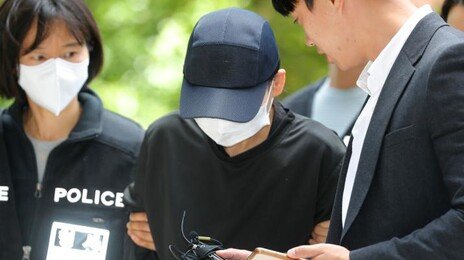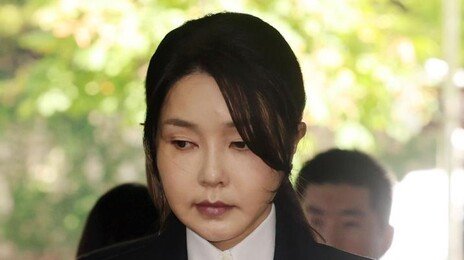공유하기
LAT 'Even Supporters Complain About…'
-
입력 2003년 10월 6일 11시 32분
글자크기 설정
The president's fall from grace followed his decision last week to resign from South Korea's ruling party, which had helped him land a stunning dark-horse victory in last year's election. The resignation is just one of a number of erratic moves by the 57-year-old Roh in his brief but eventful seven months in office.
The maverick labor lawyer has filed libel suits against leading newspapers for stories about his family's real estate dealings and disparaged South Korean journalists as corrupt hacks who only want to be wined and dined. He has managed to insult key supporters, telling one group that its members voted for him only because they hated his opponent and therefore didn't deserve his attention.
"He hurts people's feelings. He's careless with his words and expects that people will somehow understand because his intentions are good," said Kim Geun Tae, a member of the National Assembly who still considers himself one of Roh's closest backers.
Opponents have been much harsher.
The Millennium Democratic Party, which Roh left Monday in what has been a messy divorce, put out a statement denouncing his departure as "an act of betrayal."
"It is like President Roh is marrying another woman after dumping his faithful wife as he gets richer," party Chairman Park Sang Cheon said of the split.
Many presidents complain of fickle electorates, but Roh's approval ratings have practically tumbled off a precipice — from more than 90% in the heady days around his Feb. 25 inauguration to the 20s and 30s.
"There is one school of thought that he is learning on the job and another that he was never up to the job to begin with," said a Western diplomat who requested anonymity.
Roh was unlikely presidential material from the start. In a country where school ties are paramount, he'd never attended college or law school, having educated himself at home. Before becoming president, his only administrative experience was an eight-month stint as minister for maritime affairs and fisheries. He had barely ventured outside South Korea — inspiring quips that he came to office less well-traveled than any recent head of state other than President Bush.
At the time of the inauguration, naysayers predicted that Roh would make a muddle of foreign policy. To the contrary, he has steered deftly between his country's most powerful ally, the United States, and the South's armed-to-the-teeth neighbor, North Korea.
Despite an image during the campaign as an anti-American firebrand, Roh patched up relations with the United States. His government has lobbied the Bush administration tirelessly, and with some success, to negotiate with rather than threaten North Korea.
"It's ironic because the criticism you heard the most at first was that he had no foreign policy experience. But that's probably what he's done best," said Peter Hayes, the director of the Nautilus Institute, a Berkeley think tank that follows Korean issues.
On the domestic front, Roh has had it tougher. No sooner had he stepped into office than the economy started reeling from the brunt of the uncertainties about North Korea and its nuclear-weapons program. The former labor lawyer's handling of strikes by truckers and auto workers raised complaints that his government was helping workers win exorbitant raises and eroding South Korea's competitiveness, while some in the business community grumbled darkly that their new president was a "socialist."
The war in Iraq also has put Roh in a bind. His decision last spring to send 700 army medics and engineers to help the U.S. rebuild the Persian Gulf nation eroded his support among left-leaning students who had campaigned enthusiastically for him. The U.S. has asked South Korea to send a larger contingent of combat troops — a request that, if granted, is likely to cost Roh his remaining support among this key group.
The top item on Roh's agenda from the outset has been to reform the political system, opening up the smoky back rooms to public scrutiny and making the process of selecting candidates more democratic. That has put him at odds with the leaders of the political parties, including his own.
The Millennium Democratic Party was formed by Roh's predecessor, President Kim Dae Jung, and was so uneasy with Roh's candidacy that it tried to dump him a few months before the election, when he was trailing in the polls.
The long-standing tensions broke out in a rowdy exchange of fisticuffs at a party meeting last month, during which one Roh backer was nearly dragged out by her hair. As a result, 43 supporters walked out and formed their own party.
The split puts Roh in a vulnerable position: If the remaining members of the Millennium Democratic Party decide to team up with the conservative opposition, which holds 149 seats in the National Assembly, they could have the required two-thirds of the 273 members for an impeachment. Even without an impeachment, Roh could find himself politically paralyzed for the rest of his five-year term.
Still, the pundits are not yet writing the political obituaries for Roh Moo Hyun. He has pulled himself out of tight spots before.
Political scientist Chung Jin Min of Seoul's Myongji University says Roh's departure from the party is a daring move that could either backfire or leave him free to forge new alliances.
Certainly, Roh's candid style and emphasis on open government have won him grudging admiration from some of his harshest critics.
Kim Kyong Won, a prominent elder statesman who served as a campaign advisor to Roh's conservative opponent, Lee Hoi Chang, recalls that he and some other Lee supporters were invited to the presidential residence in July and asked to voice their criticism of the new government. Kim said he was surprised that Roh really listened and didn't appear to be upset.
"We are proving to ourselves with Roh that we are really becoming a democracy. The degree of tolerance for criticism is much higher than it ever was in the past," Kim said.
"Ninety-nine percent of the people in my circle are critical of Roh.... I too disapprove of many things the president has done, but nobody is calling my house at midnight making threatening remarks. That is what I call progress."
트렌드뉴스
-
1
李, 로봇 도입 반대한 현대차노조 겨냥 “거대한 수레 피할수 없다”
-
2
오세훈 “장동혁 물러나야” 직격…지방선거 전열 흔들리는 국힘
-
3
한동훈 다음 스텝은…➀법적 대응 ➁무소속 출마 ➂신당 창당
-
4
“밀약 여부 밝혀야”…與의원에 보낸 국무위원 ‘합당 메시지’ 포착
-
5
K방산 또 해냈다…한화, 노르웨이에 ‘천무’ 1조원 규모 수출
-
6
국방부, 계엄 당일 국회 침투한 김현태 前707단장 파면
-
7
유엔사 “DMZ법, 정전협정서 韓 빠지겠다는것” 이례적 공개 비판
-
8
트럼프 “다른 나라는 현금인출기…펜 휘두르면 수십억불 더 들어와”
-
9
[사설]장동혁, 한동훈 제명… 공멸 아니면 자멸의 길
-
10
장동혁, 강성 지지층 결집 선택… 오세훈도 나서 “張 물러나라”
-
1
오세훈 “장동혁 물러나야” 직격…지방선거 전열 흔들리는 국힘
-
2
장동혁, 결국 한동훈 제명…국힘 내홍 격랑속으로
-
3
한동훈 “기다려달라, 반드시 돌아올것…우리가 보수 주인”
-
4
홍준표 “김건희 도이치 굳이 무죄? 정치판 모르는 난해한 판결”
-
5
李 “국민의견 물었는데…설탕세 시행 비난은 여론조작 가짜뉴스”
-
6
유엔사 “DMZ법, 정전협정서 韓 빠지겠다는것” 이례적 공개 비판
-
7
‘소울메이트’서 정적으로…장동혁-한동훈 ‘파국 드라마’
-
8
한동훈 다음 스텝은…➀법적 대응 ➁무소속 출마 ➂신당 창당
-
9
[속보]장동혁 국힘 지도부, 한동훈 제명 확정
-
10
국방부, 계엄 당일 국회 침투한 김현태 前707단장 파면
트렌드뉴스
-
1
李, 로봇 도입 반대한 현대차노조 겨냥 “거대한 수레 피할수 없다”
-
2
오세훈 “장동혁 물러나야” 직격…지방선거 전열 흔들리는 국힘
-
3
한동훈 다음 스텝은…➀법적 대응 ➁무소속 출마 ➂신당 창당
-
4
“밀약 여부 밝혀야”…與의원에 보낸 국무위원 ‘합당 메시지’ 포착
-
5
K방산 또 해냈다…한화, 노르웨이에 ‘천무’ 1조원 규모 수출
-
6
국방부, 계엄 당일 국회 침투한 김현태 前707단장 파면
-
7
유엔사 “DMZ법, 정전협정서 韓 빠지겠다는것” 이례적 공개 비판
-
8
트럼프 “다른 나라는 현금인출기…펜 휘두르면 수십억불 더 들어와”
-
9
[사설]장동혁, 한동훈 제명… 공멸 아니면 자멸의 길
-
10
장동혁, 강성 지지층 결집 선택… 오세훈도 나서 “張 물러나라”
-
1
오세훈 “장동혁 물러나야” 직격…지방선거 전열 흔들리는 국힘
-
2
장동혁, 결국 한동훈 제명…국힘 내홍 격랑속으로
-
3
한동훈 “기다려달라, 반드시 돌아올것…우리가 보수 주인”
-
4
홍준표 “김건희 도이치 굳이 무죄? 정치판 모르는 난해한 판결”
-
5
李 “국민의견 물었는데…설탕세 시행 비난은 여론조작 가짜뉴스”
-
6
유엔사 “DMZ법, 정전협정서 韓 빠지겠다는것” 이례적 공개 비판
-
7
‘소울메이트’서 정적으로…장동혁-한동훈 ‘파국 드라마’
-
8
한동훈 다음 스텝은…➀법적 대응 ➁무소속 출마 ➂신당 창당
-
9
[속보]장동혁 국힘 지도부, 한동훈 제명 확정
-
10
국방부, 계엄 당일 국회 침투한 김현태 前707단장 파면
-
- 좋아요
- 0개
-
- 슬퍼요
- 0개
-
- 화나요
- 0개



댓글 0